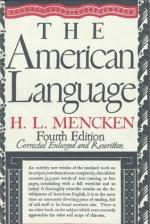
|
| Name: _________________________ | Period: ___________________ |
This test consists of 15 multiple choice questions and 5 short answer questions.
Multiple Choice Questions
1. According to Mencken, what did the first generations born in the New World value as a virtue over enterprise and resourcefulness?
(a) Niceness.
(b) Temperance.
(c) Courage.
(d) Ingenuity.
2. Which defender of Americanisms cited by Mencken in Chapter 1.3 states that "Language is made by the people"?
(a) George Ade.
(b) William Archer.
(c) Edgar Jepson.
(d) Richard Aldington.
3. What notable author was the first Englishman to carry Americanisms successfully back to his home?
(a) G.K. Chesterton.
(b) Joseph Conrad.
(c) Cleveland Coxe.
(d) Charles Dickens.
4. What word in American is used for the English word "shoe?"
(a) Slipper.
(b) Footing.
(c) Boot.
(d) Sandal.
5. To what phrase did Benjamin Franklin, Noah Webster, and Robert Southey object as a base Americanism, as discussed in Chapter 2.3?
(a) To process.
(b) Free endorsement.
(c) To advocate.
(d) To indulge.
6. In what language did the American derivative "coyote" originate?
(a) French.
(b) Mayan.
(c) Spanish.
(d) Aztec.
7. Whom does Mencken use to exemplify the flouting of linguistic purity in Chapter 6.1?
(a) Working men.
(b) Famers.
(c) Professors.
(d) Politicians.
8. What is the second characteristic that Mencken attributes to American English in Chapter 1.5?
(a) Translatability to British English.
(b) Disregard of rule and precedent.
(c) Resistance to neologisms.
(d) Disunity of regional dialects.
9. How many classifications of Americanisms does Gilbert M. Tucker provide in 1921?
(a) Twelve.
(b) Thirteen.
(c) Two.
(d) Twenty.
10. What vowel sound was dominant in 18th century New England pronunciation, despite common protests to the contrary?
(a) Flat e.
(b) Broad a.
(c) Broad o.
(d) Flat a.
11. What word did the editor of the Westminster Gazette substitute for the incomprehensible dash in the mangled Americanism of Rupert Brooke?
(a) Brains.
(b) Jugs.
(c) Boots.
(d) Bottom.
12. Which of the following groups of foreign immigrants does Mencken not attribute influence over American English in Chapter 6.4?
(a) South-Pacific Asian Islanders.
(b) Italians.
(c) Slavic peoples.
(d) Russian Jews.
13. Mencken describes the American language as having a "democratic enmity" to all what, in the beginning of Chapter 6.1?
(a) Grammatical rules.
(b) Regulation.
(c) Individualism.
(d) Authority.
14. According to Mencken, democratic government is essentially government by whom?
(a) Politicians.
(b) The working class.
(c) Businessmen.
(d) Amateurs.
15. To what country does the English correspondent in Chapter 4.5 ascribe many American expletives?
(a) Sweden.
(b) Germany.
(c) France.
(d) Ireland.
Short Answer Questions
1. What event does Mencken credit with strengthening the obfuscation of distinction between American and British English?
2. What ethnicity of people, through the influence of the mercantile class, is referred to by a different name in the United States than in England?
3. What English word does the author of "Men and Manners" lament about the American re-signification?
4. Who proposed a generally accepted nomenclature for currency in 1785?
5. Which of the following groups of immigrants does Mencken claim have a profound effect on not only the American vocabulary, but also its pronunciation and idiom?
|
This section contains 459 words (approx. 2 pages at 300 words per page) |

|




